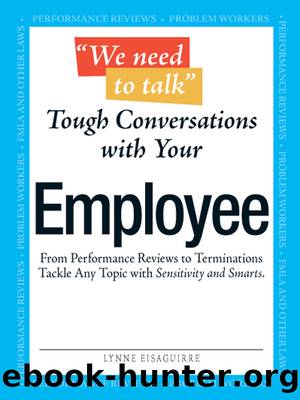We Need to Talk--Tough Conversations With Your Employee by Lynne Eisaguirre

Author:Lynne Eisaguirre
Language: eng
Format: epub
Tags: ebook, book
Publisher: Adams Media
Published: 2009-01-15T00:00:00+00:00
In one study, 69 percent of private-sector companies were found to conduct drug tests, yet only 5 percent of workers came up positive. Even when employers reasonably suspected drug abuse, less than 15 percent of employees tested positive.
This has led many advocates to claim that drug testing is an invasion of privacy and overly broad. They make this argument based on the theory that drug testing invades our bodies, a very personal zone for most of us. Unfortunately, a urinalysis not only reveals illegal drug use, but also any other medication taken for depression, HIV, epilepsy, high blood pressure, and other private and sensitive medical conditions. It is basically surveillance of someoneâs private life.
Because of these concerns, the U.S. Supreme Court has found that employers must have a compelling reason to test for drugs. Compelling reasons have included safety issues, such as upholding the right to test employees for drugs immediately after work-related accidents. The Supreme Court has limited the availability of drug testing for employees currently working because it is overly broad and results in a lot of false positivesâup to 1 to 2 percent. That may sound like a small amount, but given that 10 million employees are tested each year, hundreds of thousands are being falsely accused of drug use based on faulty tests. Some experts believe the rate of false positives is as high as 62 percent.
Despite these problems, the Supreme Court has upheld drug testing for jobs where there are health and safety concerns such as employees with national security clearances, airline personnel, corrections officers, transportation employees, chemical weapons plant employees, Army civilian employees, police officers, nuclear power plant workers, and water treatment plant workers.
What about testing for drugs when you believe that you have a reasonable suspicion that employees are using on the job? A 1997 California appellate case provides a cautionary tale. A senior manager saw an executive secretary sitting with her elbows on her knees, looking down at the ground. She didnât move or answer when he asked her what was wrong. He called HR and told them he thought she was having âfemale problems.â
Download
This site does not store any files on its server. We only index and link to content provided by other sites. Please contact the content providers to delete copyright contents if any and email us, we'll remove relevant links or contents immediately.
The Lost Art of Good Conversation by Sakyong Mipham(2126)
How We Talk by N. J. Enfield(1957)
F You Very Much by Danny Wallace(1710)
All-In (The Gamblers Book 1) by Sarah Curtis(1515)
How To Walk In High Heels: The Girl's Guide To Everything by Morton Camilla(1348)
The Art of Communicating by Thich Nhat Hanh(1250)
Botswana--Culture Smart! by Michael Main(1238)
Men and Manners by David Coggins(1121)
The Essentials of Business Etiquette by Barbara Pachter(1085)
That's Not What I Meant! by Deborah Tannen(1083)
Secrets of the Southern Belle by Phaedra Parks(1069)
Colloquial Hindi by Bhatia Tej K(1061)
GQ How to Win at Life by Charlie Burton(967)
50 Things Every Young Gentleman Should Know (GentleManners) by John Bridges & Bryan Curtis(959)
Would It Kill You to Stop Doing That: A Modern Guide to Manners by Henry Alford(957)
The Leader Phrase Book by Alain Patrick(954)
Etiquette in Society, In Business, In Politics, and at Home by Emily Post(948)
GQ How to Win at Life: The expert guide to excelling at everything you do by Burton Charlie(938)
Treating People Well by Lea Berman & Jeremy Bernard(922)
